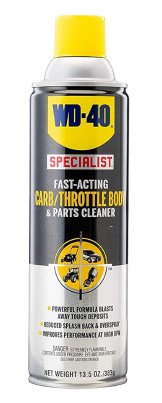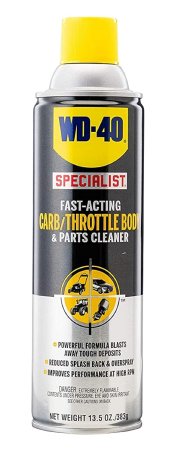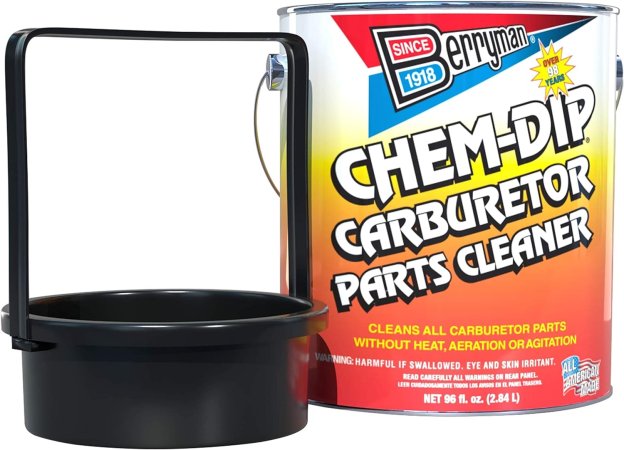We may earn revenue from the products available on this page and participate in affiliate programs. Learn more ›

If you’re not willing to roll up your sleeves and get dirty to keep a timeless machine running right while simultaneously building a bond not even the sun exploding could shatter, owning a classic car is not for you. You might like the way they look, sound, and the impression they leave on people, but you’d be far happier in something cushier like a late-model muscle car that’s only service intervals are so spaced out that you might even forget they exist.
The truth is that classic cars are more demanding of their owners. The benefit of rock-solid reliability is a by-product of an intimate relationship between car and driver in which you will be engaged with everything under the hood.
A big part of the process is keeping the carburetor clean. Over time, dirt, debris, and all kinds of gunk will block up all the passages. You’ll need to clear them up to keep that thing from bucking, sputtering, and falling flat on its face between stoplights. But before we get into the specifics of the process of cleaning that bad boy up, we need to collect the right materials, starting with carburetor cleaner.
Summary List
- Best Overall: WD-40 Specialist Fast-Acting Carb/Throttle Body Parts Cleaner
- Best Value: CRC Carb and Choke Cleaner
- Honorable Mention: Berryman 0996 Chem-Dip
Our Methodology
This is one of the easiest buying guides for us. Keeping carburetors in shape is second nature for us. Over the years, we’ve restored, driven, modified, and done basically everything one could with carbureted vehicles. Therefore, we can draw from personal experience and research-backed expertise to build a list of suggestions for you. What you see below are all items we’ve used and strongly recommend to anyone getting involved with classic cars.
Best Carburetor Cleaners Reviews & Recommendations
Best Overall: WD-40 Specialist Fast-Acting Carb/Throttle Body Parts Cleaner
Pros
- Safe for use on unpainted metal parts
- Suitable for restoration work and modern cars
- Works fast, even when facing stubborn buildup and dirt
Cons
- Doesn’t include a straw for targeting tight areas
- Can leave some deposits behind
There are a few reasons why we chose WD-40’s carb cleaner as our top pick. The aerosol can comes in 13.5-ounce cans and is packed with a fast-acting spray that won’t have you waiting around for the parts to come clean. Despite the strength, it won’t harm painted surfaces and is designed for use on throttle bodies and carburetors without concern.
The only drawback we could find on the WD-40 Fast-Acting Carb/Throttle Body & Parts Cleaner was the absence of a straw. It’s also a simple spray that won’t hit particularly tough deposits common to neglected carburetors.
Best Value: CRC Carb and Choke Cleaner
Pros
- Low VOC content
- Fast-acting formula that allows you to clean up faster
- Works on deposits caused by sludge, gum, and varnish
Cons
- No straw included for targeted spray
- May not be suitable for use around plastic or rubber
For those living in California, CRC is a carburetor cleaner you can easily buy and not go broke over. It’s VOC-compliant and won’t harm any oxygen sensors or catalytic converters it comes into contact with. The fast-acting cleaning action works quickly to remove stubborn contaminants, dissolving them to be easily washed off.
Not having a straw to attach to the nozzle of this product is one of the drawbacks. It’s also important not to use this product around painted areas, and also be careful of other materials besides unpainted metal. The cleaner could potentially damage these components. All the same, you can easily use CRC’s Carb u0026amp; Choke Cleaner.
Honorable Mention: Berryman 0996 Chem-Dip
Pros
- Cuts through stubborn deposits regular cleaners struggle with
- Easy to use
- Lasts far longer than sprays
Cons
- Expensive
- Takes hours to work
- Further cleaning required
Berryman’s Chem-Dip is a must-have for anyone dealing with exceptionally dirty carburetors. The dip is designed to eat through varnish, carbon, oil, and anything else that’ll keep your carburetor from doing its job. Unlike a spray can, you simply drop the parts into the basket, lower them into the dip, and let it eat away at everything you don’t want inside your machine. A massive benefit to this style of cleaner, on top of being strong and easy to use, is that it lasts far longer than spray cleaners.
The cost might be the first thing to take you back, but it’s not the only hit you take when using this style of cleaner. It takes hours to work through stubborn deposits, and even after it’s done, you will need to follow up with spray cleaners to reach all the hidden places fluid may remain.
Our Verdict
We chose the WD-40 Specialist Fast-Acting Carb/Throttle Body & Parts Cleaner as our top pick for best carburetor cleaner because of the fast-acting formula that cuts down on carbon contaminants quickly so you can get back on the road. The CRC Carb & Choke Cleaner is another great alternative if you’re working on a budget.
What to Consider When Buying Carburetor Cleaners
Types of Carburetor Cleaners
Aerosol/Spray Can
Carburetor cleaners generally come in the form of a spray can. This delivery method is excellent for blasting out small, relatively loose deposits in the many hard-to-reach places inside a carburetor. Just be mindful of what you’re doing when using these types of cleaners, as they will almost certainly be redirected from the carburetor directly into your eyes.
Dipping Can
Sometimes, a carburetor needs more than a simple cleaning. After months of sitting and years of neglect, all kinds of heavy deposits will form inside the carburetor. At this point, a long soak in something that can cut through the gunk is in order. That’s where chemical dips come in. These systems often come with a basket inside the cleaner itself for you to drop parts into, and they vary in size. A single gallon is enough for the average enthusiast, but a larger 5-gallon bucket is far better for folks who frequently restore carburetors.
Carburetor Cleaners Pricing
The price you pay is highly dependent on the specifics of the carburetor cleaner you buy. Spray cans generally range from $5-$10 per bottle, with the brand having the most significant influence on pricing. Chemical dips land somewhere around $40-$50 for a single gallon, with 5-gallon buckets landing around $200-$300.
FAQs
You have questions. The Drive has answers.
Q: Do I have to take the carburetor out of the car in order to clean it?
It depends on the carburetor. You will want to research your exact setup to see if this process is feasible. However, it’s almost always easier to simply remove it and clean it on an open benchtop.
Q: How often should I clean my carburetor?
Generally speaking, you should clean your carburetor every time you change your oil. For most vehicles, that’s about every 3,000 miles. However, you may want to clean it more often if your car sits for long periods of time. If left alone, the contaminants sitting on the carburetor could potentially damage the metal and cause even more problems.
Q: What symptoms can a dirty carburetor cause?
Dirty carburetors are often the cause of rough idle, decreased horsepower, and any other symptoms relating to an engine that isn’t running as it should. There are a few key components that allow an engine to perform well. These include the correct air-fuel ratio, spark, and timing. Dirty carburetors affect the air-fuel ratio and can cause a number of issues to occur if left unchecked.
Q: What other types of engines have carburetors, besides cars and trucks?
Motorcycles, lawn mowers, and even airplanes have carburetors. Many small engines have carburetors because it’s easier to control the flow of fuel than it is with a fuel injection system.






